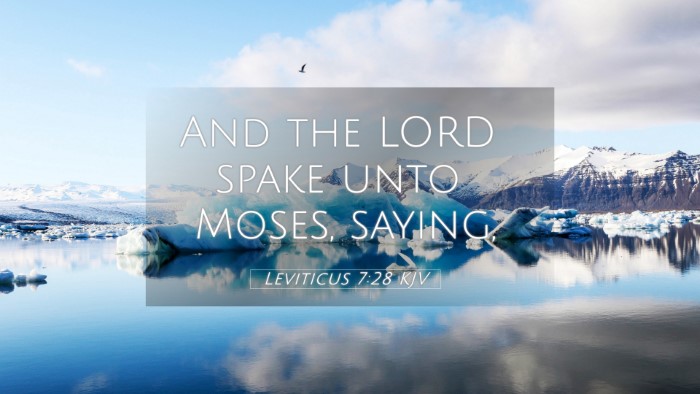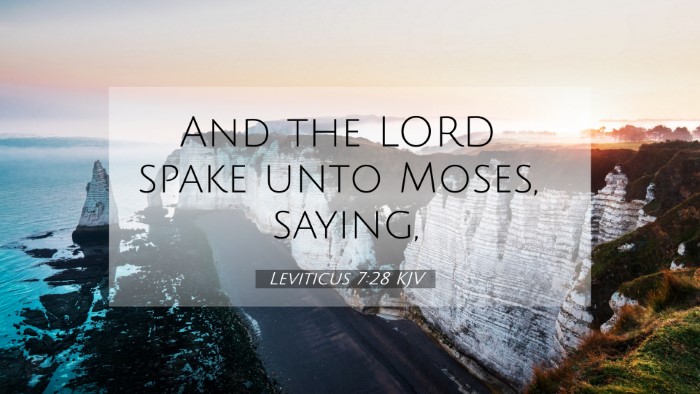Understanding Leviticus 7:28
Leviticus 7:28: "And the Lord spake unto Moses, saying," This verse introduces God’s instructions regarding the peace offering, highlighting its communal and sacrificial significance within the Israelite worship practices.
Interpretation and Insights
This verse marks a transition into specific guidelines regarding the offerings, focusing on the peace offerings. The commentators emphasize several key themes:
- Divine Communication: The mention of God speaking underscores the direct communication between God and Moses, affirming the notion of divine authority in establishing laws.
- Significance of Offerings: As outlined by various commentators, peace offerings signify gratitude and fellowship with God, serving as a means for the Israelites to express thankfulness and maintain a relationship with Him.
- Community Involvement: Peace offerings, in particular, were communal and involved shared meals, representing harmony among the congregation and God.
Commentary Insights
Matthew Henry: He highlights the importance of obedience to God’s commands regarding offerings, emphasizing that these rituals were designed to foster a sense of reverence and communal unity among the people.
Albert Barnes: Barnes discusses how these offerings were not only for atonement but also for celebration, suggesting they were a means for the people to partake in joyful worship and maintain a close relationship with the Lord.
Adam Clarke: Clarke reflects on the nature of offerings as a reflection of Israel's gratitude to God, indicating how these practices were integral to their worship and identity as a covenant people.
Connections Between Bible Verses
This verse is tightly woven into a tapestry of related scriptures, thus providing deeper insight into its meaning:
- Exodus 20:24: "An altar of earth thou shalt make unto me..." - Discusses the establishment of altars and the offerings that would be presented.
- Leviticus 3:1: "And if his oblation be a sacrifice of peace offering..." - Details the process and regulations surrounding peace offerings.
- 1 Samuel 15:22: "To obey is better than sacrifice..." - Highlights the relational aspect of offerings in obedience to God's commands.
- Hebrews 13:15: "By him therefore let us offer the sacrifice of praise..." - Illustrates the New Testament continuation of the offerings concept in spiritual praise.
- Psalm 107:22: "And let them sacrifice the sacrifices of thanksgiving..." - Encourages the practice of thankfulness through offerings.
- John 14:6: "I am the way, the truth, and the life..." - Connects to the theme of approaching God through offerings, fulfilled in Christ.
- Romans 12:1: "Present your bodies a living sacrifice..." - Mirrors the concept of offerings in a New Testament context, linking our lives to the principles of sacrifice and worship.
- Matthew 5:24: "First be reconciled to your brother..." - Emphasizes the importance of reconciliation in the context of offering.
- 2 Corinthians 9:7: "God loves a cheerful giver..." - Reflects the spirit behind offerings, paralleling the peace offerings of Leviticus.
- Colossians 3:17: "And whatsoever ye do in word or deed..." - Underlines the holistic approach to living as a form of offering before God.
Thematic Connections
Leviticus 7:28 fits into broader themes of sacrifice and covenant in Scripture:
- Sacrificial System: The Levitical sacrifices establish patterns of worship that recur throughout the Old Testament, culminating in the New Covenant.
- Community Worship: Peace offerings exemplify collective worship and community well-being, emphasizing that offerings are communal expressions of faith.
- Gratitude and Atonement: The themes of thanksgiving are interwoven with atonement, reminding believers of God’s grace and their responsive worship.
- Obedience and Relationship: These themes are foundational to understanding the dynamics of faithfulness in the biblical narrative.
Cross-Referencing Biblical Texts
The importance of inter-Biblical dialogue is crucial for a holistic understanding of the themes of offerings and worship. This verse serves as a node in the vast network of scriptural cross-referencing, providing rich insights into both historical and contemporary applications of worship.
Conclusion
Leviticus 7:28, through its instruction about peace offerings, illustrates significant aspects of worship that can be applied today. Understanding this verse within its context and through its connections with other scriptures enriches the interpretation and relevance of the biblical text for contemporary believers.
The systemic approach to studying biblical themes through cross-referencing not only enhances understanding but also guides practical applications in faith and community worship.


